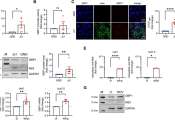Protein droplets likely don't cause Parkinson's, study suggests
Liquid-liquid phase separation is not a precursor to formation of amyloid fibrils, a pathological hallmark of Parkinson's disease, shows a recent study. Rather, the formation of protein into liquid droplets may help to dissolve ...
Jul 15, 2024
0
12









